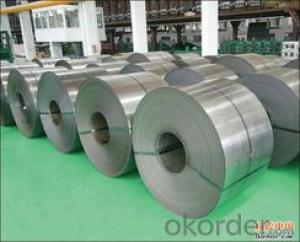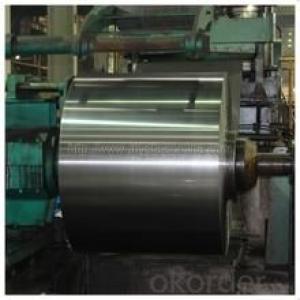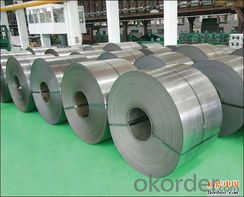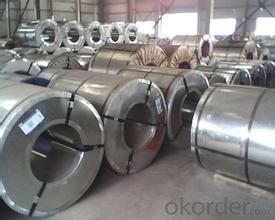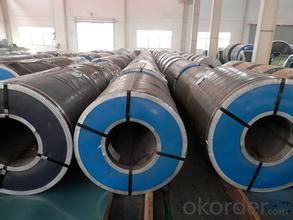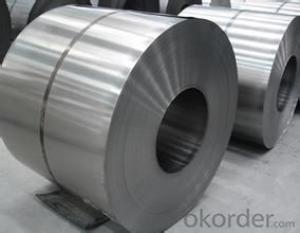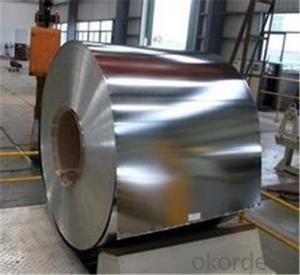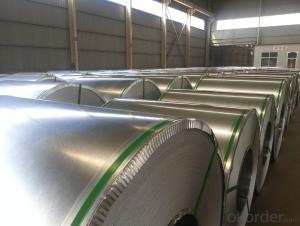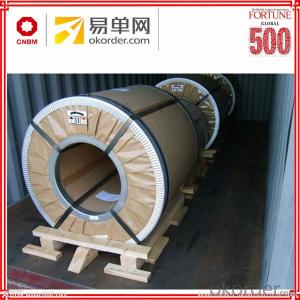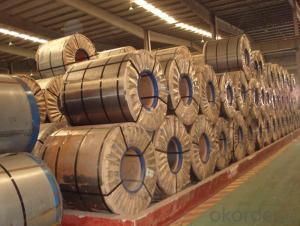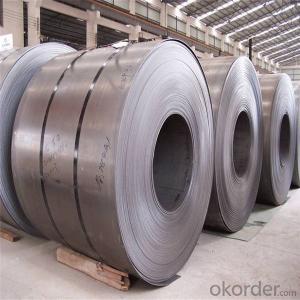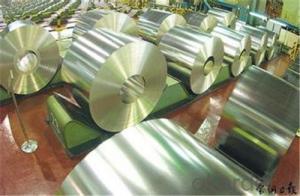cold rolled steel coil / sheet / plate in CNBM
- Loading Port:
- Tianjin
- Payment Terms:
- TT OR LC
- Min Order Qty:
- 50 m.t.
- Supply Capability:
- 5000000 m.t./month
OKorder Service Pledge
OKorder Financial Service
You Might Also Like
Specification
The raw material of cold rolled steel coil/sheet is high quality hot rolled product, and after pickling, kinds of new technology and new process of global cold rolling production have been applied. Therefore the manufacturing, home appliance, automobile etc.
COLD ROLLED STEEL | |
Thicknenss | 0.10mm-4.00mm |
Width | 600mm-2000mm |
Sheets length | 1200-6000mm |
Coil inner diameter | 508-610mm |
Surface treatement | matt finish/bright finish,oiling/dry, bright anneal/black anneal |
Coil weight | 3-5t |
Quality of the goods could be guaranteed. The finished product has a variety of excellent capabilities, such as continuous rolling, degreasing, annealing, skin pass, slitting and cut to length line etc. Along with it many rocessing capability and smooth, flat surface. It’s widely used in outdoor and interior decoration, furnishing
We can ensure that stable quality standards are maintained, strictly meeting both market requirements and customers’ expectations. Our products enjoy an excellent reputation and have been exported to Europe, South-America, the Middle-East, Southeast-Asia, Africa and Russia etc.. We sincerely hope to establish good and long-term business relationship with your esteemed company.
- Q: What is the width range of steel coils?
- The width range of steel coils can vary depending on the specific requirements and industry standards, but generally, it can range from a few millimeters to several meters.
- Q: what do you think about it? Is it a good steel for the money? the knife that i have with that steel is the kershaw chill. good knife for the price
- 8Cr13MoV is a decent blade steel...not a great steel, but about as good as you will generally find without paying much higher prices. It's used by a number of well known knife makers... It's basically equivalent to AUS-8 and will work and hold an edge reasonably well for most basic cutting chores. *************************************** From Wikipedia, the free encyclopedia: 8Cr13MoV, a Chinese stainless steel tempered at the Rc56 to Rc58 range and used in the Tenacious, Persistence, Ambitious, Resilience, Grasshopper, Kiwi3 and Byrd lines of knives. Often compared to AUS-8, but with slightly more Carbon.
- Q: 3 bedroom rambler with attached garage. A bad hail storm in May damaged my white siding and roof. I am concerned insurance adjustThanks much.er will not give me replacement value for steel siding. Any one know the cost and where to buy in Minnesota.
- In answer to you vinyl vs. steel siding. The differences are dramatic. Vinyl has the tendency to sag for two reasons; 1. Poor install, 2. Poor quality of the siding. I am a strong advocate of steel siding and seamless steel in particular. I am familiar with steel siding jobs that have been installed over 15-20 years. A high quality steel siding only needs to be rinsed or washed every few years to maintain its original look. Steel may cost more up front but it will pay back in spades for years to come.
- Q: What are the common coil thickness and width combinations available for steel coils?
- The common coil thickness and width combinations available for steel coils can vary depending on the specific requirements and standards of the industry. However, there are some commonly found combinations that are widely used. In terms of coil thickness, common options range from thin to thick coils. Thin coils typically have a thickness ranging from 0.4mm to 3.0mm, while medium thickness coils can be around 3.0mm to 6.0mm. For thicker coils, the range can be from 6.0mm to 25.0mm or even higher, depending on the specific application. Regarding coil width, it also varies based on the intended usage. Some common options include coils with widths of 600mm, 750mm, 900mm, 1000mm, 1200mm, 1250mm, and 1500mm. However, wider or narrower coils can also be available depending on the specific requirements of the customer or industry. Ultimately, the most suitable coil thickness and width combination will depend on factors such as the intended application, manufacturing processes, transportation limitations, and customer preferences. It is essential to consult with steel coil manufacturers or suppliers to determine the most appropriate options for your specific needs.
- Q: How are steel coils protected during shipping?
- Various measures are implemented to safeguard steel coils during shipping, guaranteeing their safety and preventing any harm. One widely used technique is the utilization of steel coil cradles or saddles. These structures, specifically designed for this purpose, securely hold the coils in place and prevent any movement or rolling during transit. Typically made from robust steel or durable materials, the cradles are engineered to withstand the weight and pressure of the coils. Additionally, steel coils are often wrapped in protective materials like plastic or paper. This wrapping acts as a barrier, shielding the coils from potential contaminants such as moisture, dust, and other detrimental factors that could compromise their quality. The wrapping is applied tightly to ensure it remains in position throughout the entire shipping process. To provide further protection, specialized equipment is used to load the coils into shipping containers or onto flatbed trucks. Coil hooks or lifting clamps are examples of such equipment, allowing for safe and secure handling, thereby minimizing the risk of accidents or damage during the loading and unloading stages. In certain cases, steel coils may be packed into wooden or metal crates to offer additional safeguarding. These crates serve as an extra layer of security and prevent any potential impacts or rough handling from causing damage to the coils. Ensuring the protection of steel coils during shipping is of utmost importance to ensure their arrival at the intended destination in optimal condition. By employing cradles, protective wrapping, specialized equipment, and additional packaging when necessary, the risk of damage is significantly reduced, resulting in a smooth and successful transportation process.
- Q: But we've had a problem with bears being attracted to the water in the Intex Inflatable pools, the bear would come at night every so often and push on the sides letting out the water.Would a bear be able to bend a steel frame before I go and spend money?
- depends on the steel thickness and positioning. frm your question I'm guessing you're not really well versed in steel framing or use... im guessing whatever you build, a bear can destroy. if i was to build it not even 100 bears can destroy it. it doesn't require much steel, it's just about bracing the positing of steel and some design.
- Q: What are the common methods of inspecting steel coils for quality control?
- Steel coils are inspected for quality control purposes using various methods. These methods involve visual inspection, dimensional measurement, and non-destructive testing. To inspect steel coils, visual inspection is a commonly used and straightforward method. This entails visually examining the surface of the coils for any visible defects such as scratches, dents, or discoloration. Visual inspection also includes checking the labeling, packaging, and identifying signs of corrosion or damage. Another crucial method to ensure quality is dimensional measurement. This involves measuring different dimensions of the coils, such as thickness, width, and length, to ensure they meet the required specifications. Tools like calipers, micrometers, or laser measurement devices can be utilized for dimensional measurement. Non-destructive testing (NDT) techniques are also widely employed in steel coil inspection. NDT methods enable the detection of internal and surface defects without causing damage to the material. Ultrasonic testing is a common NDT technique used for steel coil inspection. It works by sending high-frequency sound waves through the coil and analyzing the reflected waves to identify any defects. In addition, magnetic particle testing and dye penetrant testing are used to detect surface cracks or defects in the coils. Apart from these methods, other quality control practices may include chemical analysis to ensure the steel's composition meets the required standards, mechanical testing to assess the strength and hardness of the material, and corrosion testing to evaluate the coils' resistance to corrosion. In summary, a combination of visual inspection, dimensional measurement, and non-destructive testing techniques is typically employed to ensure the quality and integrity of steel coils during the quality control process.
- Q: I bought my Gerber Scout for 29 bucks at the local Walmart a couple months ago, and so far it's performed better than any of my previous knives (a couple of low quality Bucks, and a Winchester). However, my friend just bought a 50 dollar Buck knife and I absolutely love it, so I'm debating trading mine in and pitching in a bit of cash for the same kind.What troubles me is the fact that everybody seems to be bashing 440A steel. I hear a lot of bad things about it; how it is soft, chips easy, dull quickly, etc. How bad is 440A steel really, and would it be worth trading in my Gerber plus about 30 cash for a Buck Vantage Pro? Apparently the Vantage Pro uses S30V steel, so is it really that big of an upgrade, from 440A to S30V? Thank you.
- Its the standard for most knives and its the easiest to sharpen, I have a couple 440 steel knives and they have never failed me, my oldest one is 11 years old and I have stabbed multiple people(in self defense, cut open backpacks, seat belts, fishing string, limes, thin rope, jeans, jackets, pockets, seats, popped tires, moved hot charcoal and other stuff, it just has to be sharpened every now and then. Although I really like carbon knives like KA-BAR's those are amazing and are the only fixed blade knife I would ever buy.
- Q: What are the different types of steel coil packaging systems?
- There are several types of steel coil packaging systems available, including horizontal coil packaging machines, vertical coil packaging machines, and coil wrapping machines. Each system is designed to securely package steel coils for transportation and storage, ensuring their protection from damage and corrosion.
- Q: What are the different types of steel coil packaging methods?
- There are several types of steel coil packaging methods, including shrink wrapping, strapping, wooden crates, and steel or plastic bands.
Send your message to us
cold rolled steel coil / sheet / plate in CNBM
- Loading Port:
- Tianjin
- Payment Terms:
- TT OR LC
- Min Order Qty:
- 50 m.t.
- Supply Capability:
- 5000000 m.t./month
OKorder Service Pledge
OKorder Financial Service
Similar products
Hot products
Hot Searches
Related keywords
